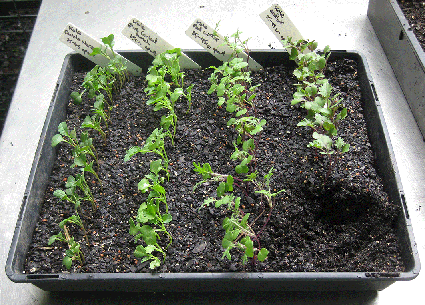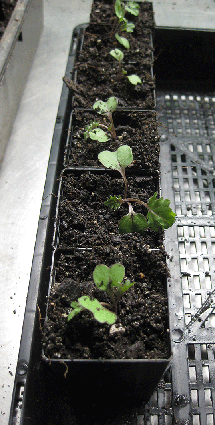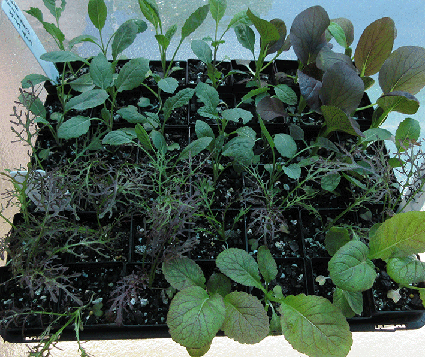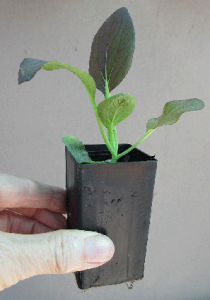Autumn sowings
I like to grow my autumn plantings of the brassica family from seed rather than just buy generic seedlings. There are so many beautiful heirlooms to choose from: ‘Violet Sicilian’ cauliflower; ‘Red Winter’, ‘Cavolo Nero’ or ‘Blue Curled Scotch’ kale; vibrant red cabbage or ruffled savoy cabbage, indispensable broccoli, leaf mustards or Asian greens.
The brassica family is one of the easiest and fastest seeds to germinate and has the advantage of storing well too.
Begin by choosing a good brand of seed raising mix and organise yourself with plenty of plant labels. If you put not just the name but the required spacing for each plant on the label it saves you hunting around for the seed envelope later. Getting the right spacing between plants is important as being put in too close will stress your plants and they will under-perform.
Mark out your rows in the seedling trays and try not to over-sow if the seed is fresh and of good quality. Most seed packets will have enough seed for multiple sowings so if correctly stored you should only need to buy a fresh lot every 2 to 3 years. Sowing too much means you will need to thin out and this is difficult to do without damaging the adjacent seedlings you want to keep.
Make sure you place the seed trays or punnets into an area with good light as otherwise they will lengthen too much trying to reach the light.

Once the 2nd set of leaves appear, it is time to prick out into a small pot. Try to handle the tiny seedling by its leaves, rather than risk crushing the stem.

After half-filling the small pot, hold the seedling in the centre and fill around it up to the bottom set of leaves, then firm down gently.
Once the first set of tiny ‘true’ leaves appear they are ready to prick out. Pricking out into a little pot about the size of a yogurt cup gives the little plant time to establish a strong root system before planting out into the garden, and means it will not suffer transplant shock. It also gives you a few more weeks to finish harvesting your summer veges.
Use a good quality potting mix. It can be enriched with sieved compost or coir peat. A small amount of organic fertiliser is a good idea. Spray regularly with Natrakelp seaweed fertiliser.
The main reason I like to do this pricking out process with the brassica family is it means I can plant them deeper. Planting them to the bottom of the seed leaves means they establish more roots and have a neater appearance in the garden. Many brassica, like broccoli and cauliflower, develop quite a long stem and if you have a big bushy plant on top of this long stem it can suffer quite a bit if your garden experiences strong winds.

Regularly spraying with Natrakelp seaweed grows strong seedlings that will be ready for planting out in a few weeks.
“In the night the cabbages catch at the moon, the leaves drip silver, the rows of cabbages are series of little silver waterfalls in the moon.” Excerpt from Nocturn Cabbage by Carl Sandburg
Tags: pricking out, seed propagation, vegetables
Posted in Organic Gardening





Good work. Your content is rich with helpful information. I usually work with flower seeds and I have always wanted to combine a veggie and a flower garden in some kind of symbiotic state. You article was useful 🙂
Thank you for such a clear description of your process! I’m in victoria and am wondering when you sow these seeds in order to never have the garden empty. Do I see as early as late Dec, early Jan? Would like to put them out at a good size like you say once my pumpkin, cucumbers and tomatoes are done for example.
Thanks in advance if you’re able to answer this!